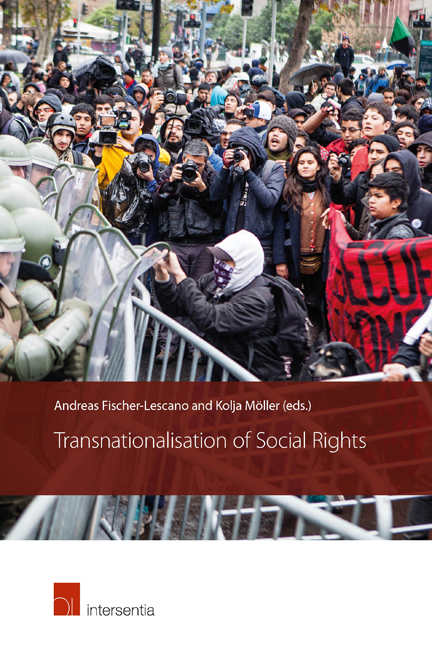Book contents
- Frontmatter
- Contents
- List of Contributors
- List of Abbreviations
- Chapter 1 Introduction
- PART I TRANSNATIONAL SOCIAL RIGHTS IN CONTEXT
- PART II FOUNDATIONS, INSTITUTIONS AND ENFORCEMENT STRUCTURES
- PART III ENFORCEMENT OF TRANSNATIONAL SOCIAL RIGHTS
- Chapter 8 Transnational Socio-Economic Rights: Inter-Linkages in the Context of the Right to Food
- Chapter 9 Agroenergy and the Right to Food: The EU Biofuel Mandate and Transnational Social Rights
- Chapter 10 Between Rights and Power Asymmetries: Contemporary Struggles for Land in Brazil and Colombia
- Chapter 11 The Zapatista Struggle for the Right to Land: Background, Context and Strategies
- Index
Chapter 9 - Agroenergy and the Right to Food: The EU Biofuel Mandate and Transnational Social Rights
from PART III - ENFORCEMENT OF TRANSNATIONAL SOCIAL RIGHTS
Published online by Cambridge University Press: 12 December 2017
- Frontmatter
- Contents
- List of Contributors
- List of Abbreviations
- Chapter 1 Introduction
- PART I TRANSNATIONAL SOCIAL RIGHTS IN CONTEXT
- PART II FOUNDATIONS, INSTITUTIONS AND ENFORCEMENT STRUCTURES
- PART III ENFORCEMENT OF TRANSNATIONAL SOCIAL RIGHTS
- Chapter 8 Transnational Socio-Economic Rights: Inter-Linkages in the Context of the Right to Food
- Chapter 9 Agroenergy and the Right to Food: The EU Biofuel Mandate and Transnational Social Rights
- Chapter 10 Between Rights and Power Asymmetries: Contemporary Struggles for Land in Brazil and Colombia
- Chapter 11 The Zapatista Struggle for the Right to Land: Background, Context and Strategies
- Index
Summary
INTRODUCTION
This chapter explores the potential and limits of Transnational Social Rights with a view to the adverse effects of global biofuel markets. The increasing use of crops for energy production is blamed for driving up international agricultural prices, replacing food production and causing local “land and water grabs” in developing countries. Until now, only few lawyers have framed the “fuel versus food” debate in a human rights discourse. In 2007, Jean Ziegler, the former Rapporteur on the Right to Food, started to call for a general moratorium on agrofuels.
Emphasising the emancipatory potential of Transnational Social Rights, Andreas Fischer-Lescano and Kolja Möllers cite the global food crises as an example of interactions between different transnational crises, such as climate change, financial speculation, and migration. They encourage social movements to draw attention to injustice by intervening in legal processes. However, they leave open the question of Transnational Social Rights could be operationalised in legal proceedings. The global “biofuel boom” illustrates that Economic, Social and Cultural rights (ESC rights), especially the right to food, need to be re-thought in transnational constellations. I will analyse to what extent biofuel projects and the support policies could result in violations of the right to food. As Audrey R. Chapman already pointed out in 1996, a “violation approach” could be a useful strategy to enhance the effectiveness of ESC rights. While Chapman especially focused on violations by state actions at national level, this case-study focuses on the extra-territorial responsibility of the European Union (EU).
The first section starts with a definition of agrofuels (Section I.A) and gives a short overview of the economic, social and environmental impact on ” food security” at global level (Section I.B). While most studies weigh the risks and benefits of biofuels, transnational peasant movements emphasise the contradiction between large-scale monocultures for energy production and the ideal of “ food sovereignty” (Section I.C). The second section describes the EU biofuelpolicy and highlights its external effects (Section II). To comply with the biofuel target of the Renewable Energy Directive (RED),4 EU Member States need to import feedstock from third countries.
- Type
- Chapter
- Information
- Transnationalisation of Social Rights , pp. 209 - 238Publisher: IntersentiaPrint publication year: 2016



